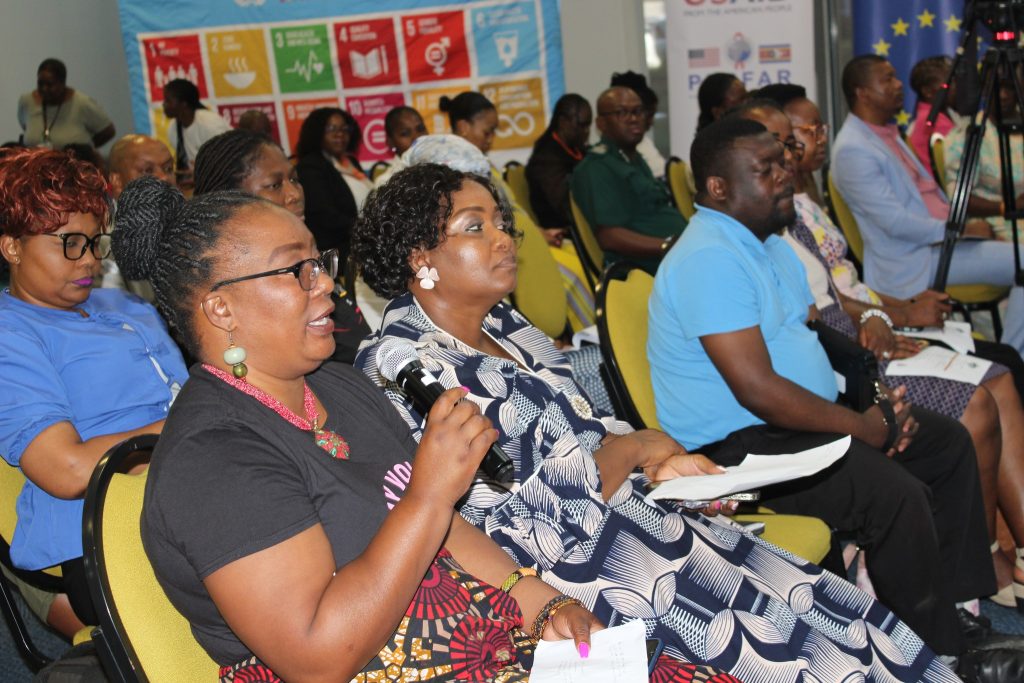by Ncaba Ntshakala
Sisonkhe ekulweni ne GBV!
The government of the Kingdom of Eswatini has issued a powerful condemnation of gender-based violence (GBV), with a clear and emphatic message to perpetrators:
“Khweshani eveni letfu, sitihlalele ngekuthula” (Leave our country, we want to live in peace). This strong statement was delivered by the Minister of Tourism and Environmental Affairs,
Jane Mkhonta-Simelane, who represented the Deputy Prime Minister during the launch of the 16 Days of Activism Against Gender-Based Violence campaign at the UN House.
The campaign, commemorated under the theme “Together Let Us End Gender-Based Violence / Sisonke,” seeks to galvanize efforts to eradicate violence that disproportionately affects women, children, and vulnerable groups.
Mkhonta-Simelane expressed the devastating toll GBV takes on Eswatini, highlighting the financial burden it imposes on the government and the broader societal costs of this scourge.
She lamented that resources spent addressing GBV could have been redirected to other developmental initiatives, emphasizing the need for collective action to end violence against women and girls.
RELATED: Minister Savannah calls for youth innovation to tackle HIV and GBV
She described the campaign as a rallying point for advocacy, knowledge sharing, and the adoption of innovative approaches to eliminate all forms of GBV, aligning with global efforts such as the Beijing Declaration and the Sustainable Development Goals (SDGs).
She reflected on the alarming prevalence of GBV and pointed out that violence against women and girls persists in both private and public spheres, often manifesting in extreme forms such as femicide.
Mkhonta-Simelane attributed the persistence of GBV to intersecting challenges, including climate change, inflation, poverty, and conflict, which exacerbate vulnerabilities and hinder effective prevention and response efforts.
The minister expressed deep concern over recent cases of brutal killings of women in Eswatini, noting that such acts are increasingly reflected in daily news headlines.
She urged emaSwati to seek help and mediation in resolving disputes, stressing that violence is never the answer.
In her remarks, Mkhonta-Simelane called on every member of society to unite against GBV, urging individuals and institutions alike to create safe spaces for women and girls.
RELATED: GBV: SADC grappling with ending scourge
She identified the family as the cornerstone of societal transformation, advocating for homes to become places where respect, dignity, and equality are instilled.
She emphasized the importance of teaching children about consent, empathy, and non-violence from a young age.
Community leaders, educators, and faith-based organizations were called upon to leverage their influence in challenging harmful norms, dismantling patriarchal structures that perpetuate abuse, and creating an environment of support for survivors rather than shame.
The minister also highlighted the critical roles schools and workplaces play in raising awareness, preventing violence, and intervening when necessary.
She stressed that the 16 Days of Activism should serve as more than a symbolic campaign; it must inspire sustained action to create a culture where violence is condemned, and equality is celebrated.
She encouraged all emaSwati to speak out, support survivors, and actively challenge practices that enable GBV.
Mkhonta-Simelane concluded by urging a shift from awareness to tangible outcomes, emphasizing that unity and collective action are the keys to breaking the cycle of violence.
She expressed gratitude to government partners and stakeholders for their ongoing support in national efforts to combat GBV.
As the campaign progresses, she called for a commitment to extend its impact beyond the designated 16 days, transforming it into a lasting movement for change.
